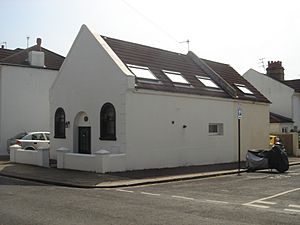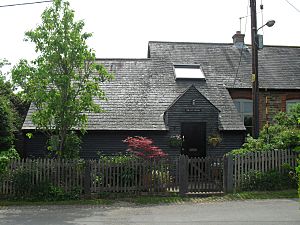Society of Dependants facts for kids
The Society of Dependants was a special Christian group that started in the mid-1800s. They were a type of Protestant Christian group who didn't follow the main Church of England. They were strongest in West Sussex and Surrey in England. In some villages, they worked together in co-operative businesses. People often called them "Cokelers," a nickname that started early on, but no one is quite sure why.
Contents
History of the Dependants
Members of the Society of Dependants were Protestant Christians who had different beliefs from the main church. They believed that people could choose to do good and find salvation (a path to heaven). This was different from some other groups who believed God had already decided who would be saved.
The Dependants were conscientious objectors. This means they refused to fight in wars because of their beliefs. They were also encouraged, but not forced, to stay unmarried.
Starting in the 1850s, they held meetings in open fields or barns. They often faced problems from rich landowners and church leaders. Both men and women preached, which was very unusual at that time. They tried to share their message with poor and humble people.
Building Chapels and Stores
The group first settled in Loxwood. This area was outside the control of large estates. Landowners there might have stopped them from using land or buildings. In 1852, a new law said that Christian groups like theirs had to register a place of worship. This made it harder to meet in open spaces.
In 1861, the first Dependant chapel opened in Loxwood. Soon after, seven more chapels were built. These were in places like Upper Norwood, Shamley Green, Warnham, Lords Hill, Northchapel, Chichester, and Hove. These chapels were simple buildings. They often had a room where people who traveled far could rest during the long Sunday worship.
Around 1879, the Dependants opened several "combination stores." These were like general stores in places such as Norwood, Lord's Hill, Northchapel, Warnham, and Loxwood. Members of the group lived and worked together in these businesses. Some followers didn't agree with getting involved in business. However, the shops did very well. They sold many different things, from soap to food.
They also grew their own food to sell. They lived together on farms they rented. When cycling became popular in the 1890s, they even opened bicycle shops. The Loxwood store also had a steam bakery. In the early 1900s, the Northchapel stores had many employees. Most of the staff lived above the shops.
All the money earned was put back into the businesses. It was also used to help members who needed it. They also made and sold furniture. These pieces were strong and well-made, and some can still be found today.
A verse from their hymn book shows their feelings about these stores:
- Christ's Combination Stores for me
- Where I can be so well supplied,
- Where I can one with brethren be,
- Where competition is defied..
Over the 1900s, the number of Dependants slowly became smaller. By the late 1980s, only a few members remained. They still worshipped in Loxwood and Northchapel.
Beliefs and Customs of the Dependants

The Dependants had some unique beliefs and customs. They believed that if they lived without sin, they would have a special place in heaven.
They had strict rules for daily life. Members would not listen to non-religious music. They only read the Bible. They did not play games or have flowers in their homes. They were also pacifists, meaning they believed in peace and refused to fight in wars. During the world wars, they were usually allowed to keep working on farms.
They did not use the Lord's Prayer in their worship. They felt it was too earthly and didn't fit with the higher spiritual life they wanted to lead.
Marriage and Worship
The Dependants did not have their own marriage ceremony. They also discouraged marriage, believing it could come between a person and God. However, marriage was not forbidden, and many members were married.
Unusually for a Christian group, the elders (leaders) of the chapels allowed young couples to live together for up to two years. This was like a trial period to see if they were a good match. After this time, they could decide to separate or get married in a church or civil ceremony.
On Sundays, the whole group would gather at the chapel. They also met two other evenings a week and on public holidays. Many members traveled long distances from farms to attend.
The women wore small black bonnets made of straw and velvet. They also wore black shawls, black coats, and long black skirts. Their hair was pulled back into a braided bun. The men also dressed in dark clothes and hats. They often had sideburns and a small beard under their chin.
Each chapel had a "Leader" and a few other elders called "Stalwarts." They did not use musical instruments or printed prayer books. Prayers were copied out by hand. The Leader would start by reading rhyming verses. The group would then chant these verses after him. Next, the Leader would read a chapter from the Bible and explain its moral lessons. After this, members might sing hymns or share their thoughts in their local accent. There was a back room in the chapel for members who had traveled far to eat and rest between services. On Bank holidays, groups might travel to special services in Loxwood.
Names of the Sect
While the group called themselves Dependants, people outside the group knew them as "Cokelers." Writers have wondered where the name "Cokeler" came from. One idea is that it came from John Sirgood, the founder, who often drank cocoa. Cocoa was not a common drink in the countryside back then.
One person, Henry W. Stiles, wrote in 1931 that a follower of Sirgood told him this story. If Sirgood was offered beer while preaching in village inns, he would say, "no but I will have some cocoa." Another idea is that a part of Loxwood was called Cokkes Field. However, there are no old maps showing this name during Sirgood's time. R. J. Sharpe wrote in 1931 that the group was also sometimes called "Ranters" in their local area. The Dependants themselves did not like or use the name "Cokelers."
 | Bayard Rustin |
 | Jeannette Carter |
 | Jeremiah A. Brown |


